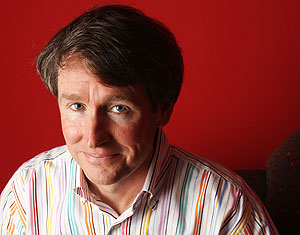book/daddy knows an 'older genius' -- and it's not himself

In The New Yorker, Malcolm Gladwell examines the popular tradition of the young genius:
Genius, in the popular conception, is inextricably tied up with precocity--doing something truly creative, we're inclined to think, requires the freshness and exuberance and energy of youth. Orson Welles made his masterpiece, "Citizen Kane," at twenty-five. Mozart wrote his breakthrough Piano Concerto No. 9 in E-Flat-Major at the age of twenty-one. In some creative forms, like lyric poetry, the importance of precocity has hardened into an iron law. How old was T. S. Eliot when he wrote "The Love Song of J. Alfred Prufrock" ("I grow old . . . I grow old")? Twenty-three. "Poets peak young," the creativity researcher James Kaufman maintains.
But studies have shown that this is simply not true, not true for lyric poetry, not true for music or literature. And Gladwell's leading example is Dallas' own Ben Fountain, a sweet guy whose terrific short story collection, Brief Encounters with Che Guevara, came out in 2006. book/daddy happily compared Ben's writing to Graham Greene -- albeit Graham Greene crossed with some South American magic realist..
But before you take heart -- you, in your cubicle, knowing that your brilliance at online poker will be recognized at any moment -- it's plain that as much as Ben's success is evidence that inspiration can strike later rather than earlier, it's testimony to his incredible persistence:
He quit his job at Akin, Gump in 1988. For every story he published in those early years, he had at least thirty rejections. The novel that he put away in a drawer took him four years. The dark period lasted for the entire second half of the nineteen-nineties. His breakthrough with "Brief Encounters" came in 2006, eighteen years after he first sat down to write at his kitchen table. The "young" writer from the provinces took the literary world by storm at the age of forty-eight.
It also didn't hurt that Ben had, in effect a patron -- his wife. Gladwell's point is that some insights come as "conceptual" breakthroughs -- the brilliant flash -- while others come incrementally, tentatively. And those artists need time (and support) to find their way.
Categories:
Blogroll
Critical Mass (National Book Critics Circle blog)
Acephalous
Again With the Comics
Bookbitch
Bookdwarf
Bookforum
BookFox
Booklust
Bookninja
Books, Inq.
Bookslut
Booktrade
Book World
Brit Lit Blogs
Buzz, Balls & Hype
Conversational Reading
Critical Compendium
Crooked Timber
The Elegant Variation
Flyover
GalleyCat
Grumpy Old Bookman
Hermenautic Circle
The High Hat
Intellectual Affairs
Jon Swift
Laila Lalami
Lenin's Tomb
Light Reading
The Litblog Co-op
The Literary Saloon
LitMinds
MetaxuCafe
The Millions
Old Hag
The Phil Nugent Experience
Pinakothek
Powell's
Publishing Insider
The Quarterly Conversation
Quick Study (Scott McLemee)
Reading
Experience
Sentences
The Valve
Thrillers:
Confessions of an Idiosyncratic Mind
Crime Fiction Dossier
Detectives Beyond Borders
Mystery Ink
The Rap Sheet
Print Media:
Boston Globe Books
Chicago Tribune Books
The Chronicle Review
The Dallas Morning News
The Literary Review/UK
London Review of Books
Times Literary Supplement
San Francisco Chronicle Books
Voice Literary Supplement
Washington Post Book World
